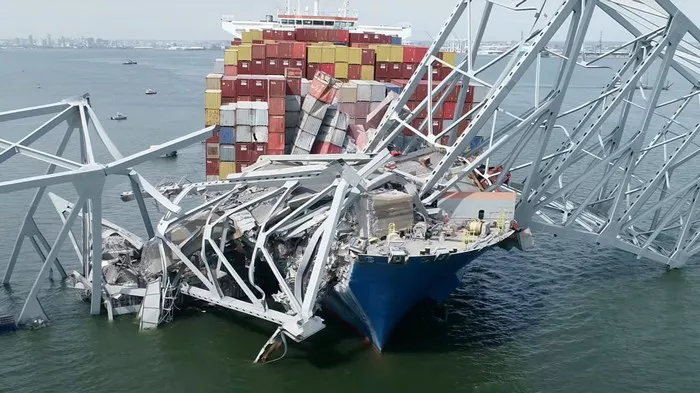In pursuit of the American dream, they sought opportunities for a better life. However, for a group of immigrants from Mexico and Central America, their aspirations turned into tragedy while working on repairs for a bridge in Baltimore. The collapse of the Francis Scott Key Bridge resulted in the deaths of six individuals, all immigrants, who were engaged in laborious tasks typically undertaken by immigrant workers. The fatal incident occurred when a container ship collided with a support pillar around 1:30 a.m. EDT on Tuesday, sending them plummeting into the frigid waters of the Patapsco River.
The bodies of Alejandro Hernandez Fuentes and Dorlian Castillo were retrieved from a submerged red pickup truck by divers the following day, while Maynor Suazo from Honduras, Jose Lopez from Guatemala, Miguel Luna from El Salvador, and another unnamed worker are still missing and presumed dead. Two additional workers were rescued from the scene.
News of the tragedy reverberated swiftly throughout Baltimore’s Hispanic community, which has witnessed a significant increase in its population in recent years, reshaping neighborhoods near the expansive port complex. Vigils were held in churches for the missing workers, and advocacy groups promptly rallied to raise $98,000 in support of the victims’ families.
The fact that all the victims were immigrants did not surprise many within the community, despite immigrants comprising less than 10% of Baltimore’s population. Lucia Islas, president of Comité Latino de Baltimore, a nonprofit organization, remarked, “One of the reasons Latinos were involved in this accident is because Latinos do the work that others do not want to do. We have to do it because we come here for a better life. We do not come to invade the country.”
According to the U.S. Bureau of Labor Statistics, Hispanic workers face a higher likelihood of on-the-job fatalities compared to other racial and ethnic groups, particularly in industries such as construction. Statistics from both government and industry sources indicate an overrepresentation of Hispanics in high-risk occupations, including construction, slaughterhouse work, and landscaping.
The workers involved in the Key Bridge incident were employed by Brawner Builders Inc, a local construction company with a history of safety violations, having been cited seven times since 2018. Company officials expressed devastation over the loss but declined to comment further when approached by Reuters.
Community leaders highlighted the economic challenges faced by many Hispanics in the city, often compelled to accept low-paying jobs with limited benefits. Carlos Crespo, a Mexican mechanic, emphasized the disparity, stating, “The only choice is to work when you don’t have the same salary that a citizen might earn.”
As efforts to support the affected families continue, Susana Barrios, vice president of the Latino Racial Justice Circle, reflected on the ongoing struggles of the Hispanic community, stating, “We go from one crisis to another.”
The tragedy unfolds against the backdrop of a U.S. presidential election where immigration remains a contentious issue. While Democratic President Joe Biden’s administration grapples with a surge in border crossings, Republican candidate Donald Trump has faced criticism for his disparaging remarks about immigrants.
Despite historically being home to a relatively small Hispanic population, Baltimore has witnessed a notable increase in recent years, with Hispanics comprising 7.8% of the city’s population in 2020, up from 4.2% in 2010.
Nelson Amaya, a pastor in a nearby suburb, noted the influx of Central American immigrants seeking employment and affordable housing, which has contributed to the city’s economy through the establishment of Hispanic businesses.
In response to the tragedy, the White House announced that existing immigration regulations could facilitate visits by relatives of the victims who reside abroad. However, for families grappling with the loss, such gestures offer little solace as they await closure and the return of their loved ones’ remains.
“We continue to wait with faith, with hope, that our brother’s body can be found so that we can begin the repatriation process, which is what interests us most,” expressed Martin Suazo, brother of one of the missing workers, from Azacualpa, Honduras. “We believe they should not forget the suffering of the families of the four victims whose bodies have not been found.”


